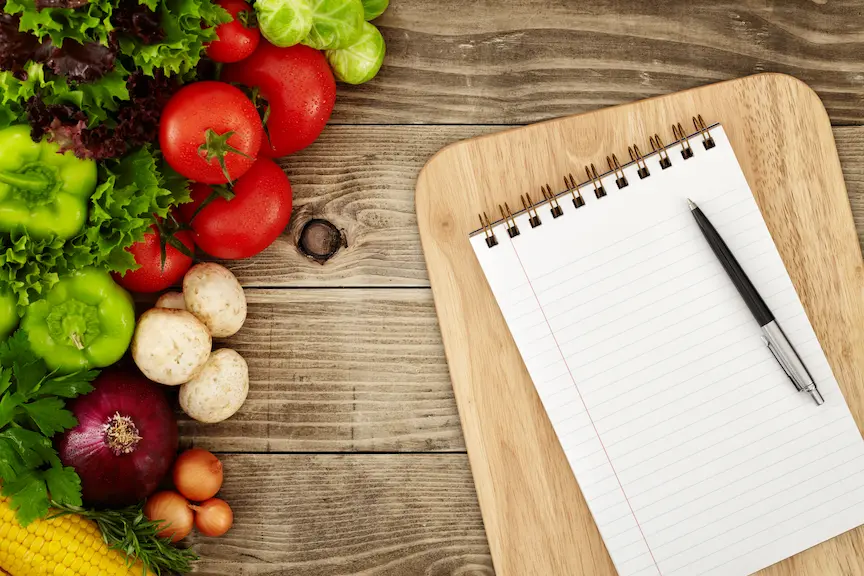
Week 4 - Drinks and Snacks
Introduction
In week four we take a look at how certain drinks and snacks can undermine our efforts to lose weight. We’ll show you how to swap unhealthy for healthy options, and how to read labels so that you can spot the hidden ingredients in your food that might be slowing down your progress.
1-
Welcome to week 4 from the Lifestyle Medicine team.
This week we’re focusing on why snacking may be affecting your ability to lose weight. We’ll also highlight which drinks can help with weight loss and which drinks are best avoided. How you eat and drink is just as important to weight loss as changing your meals.

Generally, we advise you to eat two to three balanced meals a day and avoid snacking as much as possible.
Snacking triggers your body to release insulin in response to your post-snack blood sugar increase. Frequent snacking can contribute to insulin resistance(1), which in turn can make losing weight more challenging. If you snack regularly throughout the day, stopping snacking might be a challenge for you. If that's the case then we advise you to slowly cut down how much you eat for each snack and ultimately reduce the number of times you eat in a day.
You can make this easier on yourself by increasing the nutrient density of the foods you eat at your main meals. Nutrient dense foods are those that have high levels of nutrients such as protein, healthy fats or complex carbohydrates and vitamins and minerals, making them more filling and better at keeping your blood sugar regulated. Focus on making one small change at a time. Changing your habits slowly can support more successful changes in the long run (2).
Another way you can support yourself is to change what you’re snacking on. Reduce high carbohydrate and high-fat snacks. Choose instead snacks which are more nutrient dense, these help to sustain you and feel good whilst maintaining your blood sugar balance. Some options include an apple or a stick of celery with a tablespoon of nut butter, or a hard boiled egg.
Plan your meals

Include a small amount of protein with each meal - especially breakfast. Examples of foods high in protein include nut butter or tahini, egg(s), a small portion of lean meat or fish, or vegan alternatives such as scrambled tofu, a small handful of nuts or seeds, or even some beans or lentils. Eating this way can help you feel fuller for longer, reduce your hunger, and so reduce your desire to snack (2).
If you feel tempted to have a snack
Stop and think…. Figure out if you’re actually hungry, thirsty, or if you’re bored or fed up. Check in with yourself and work out what’s triggered you to reach for a snack. Has something happened that has made you feel anxious, worried, stressed or sad (emotions often make you want to eat)? Or, do you have real physical hunger?
If you realise that you're being tempted to snack because of how something has made you feel (4) we suggest that you stop, take a five minute break from whatever you're doing, and do something to distract yourself. Distracting yourself for a few minutes is often all it takes for you to get rid of the craving or urge to snack. The more often you catch yourself and change your behaviour the easier it will become.
Try doing a puzzle on your phone like a sudoku or have a chat with a friend. Another option is to have an “exercise snack”. In other words, taking a couple of minutes to do a vigorous activity like dancing, body weight squats or marching on the spot. Or try getting outside and going for a short walk .
“Exercise snacks” are a relatively new idea which research has found to be a great way to improve your physical health (5). “Exercise snacks” involve doing short 1 minute bursts of vigorous activity a few times in the day. The exercise you choose can be anything you like. Challenge: Can you swap one of your food snacks for an “exercise snack”?

If, after you've checked in with yourself, you find that you’re genuinely hungry, then choose something from the list of snacks below. Think of a snack as a mini meal, and make sure it contains a balance of macronutrients (protein, fat and low sugar carbohydrates)and some fibre to sustain you. Healthy Snack Ideas:
- Chopped apple with a tablespoon of nut butter (sugar free).
- Hard boiled egg
- Hummus and celery sticks
- Edamame beans.
- Roasted chickpeas.
- Smoothie with protein powder.
- Oatcake with nut butter.
- Greek yoghurt with berries.
- Half an avocado.

Drinks - What you drink can be just as important as what you eat for weight loss and management. Staying hydrated is key to successful weight loss.
The idea of drinking plain water may not appeal to you - so we thought we’d share some research here to highlight some other healthy ways you can keep hydrated. A small research study found that there are two major benefits to staying hydrated when aiming to lose weight. When you’re hydrated you’re less likely to overeat, and being hydrated also helps your body's fat stores to be broken down (6).
The opposite is also true - when your body is dehydrated you're likely to store fat more easily and poor hydration is associated with higher BMI so it might hamper your weight loss efforts (7).
Do diet sodas help you lose weight?
At the moment there are mixed views on whether diet sodas or soft drinks are healthy to drink or not.
We’ve looked at the evidence and have found that artificial sweeteners that are added to diet fizzy drinks may contribute to becoming insulin resistant (8). More research is needed in this area, but for now we recommend that you limit your intake of these drinks and have them only as an occasional treat, not as part of your daily fluid intake.
What to drink to help with weight loss
Aim to drink a minimum of 1.5- 2 litres of water a day - unless you've been medically advised not to. If you find that drinking water is boring then why not add some flavour to it with sliced fruit like orange or lemon, or fresh herbs like mint, or lemon balm? Or, you can try herbal or fruit teas, hot or cold, just make sure they don’t have any added sugar.
Green tea: Shown to Help Reduce Fat Stores

Matcha is a type of mild-flavoured, potent, green tea that contains additional catechins (strong antioxidants), which can support weight loss (9).
Try drinking a few cups of this green tea each day to support hydration and weight loss.
Diluted Apple Cider Vinegar has been shown to boost weight loss through improving insulin sensitivity. Add 15mls to 500 mls of water and drink before meals throughout the day (10).
Black Tea (11) and Coffee can be enjoyed in moderation to support weight loss. This is because the caffeine in black tea and coffee (also found at lower levels in green tea) may help to promote weight loss (12).
Enjoy these with no added sugar or the benefits will be lost. If you experience regular issues with poor sleep or insomnia we recommend avoiding caffeinated drinks later in the day and swapping to caffeine-free options after lunch.
If you're struggling to work out how much you need to eat, it may help to work out your basal metabolic rate (BMR) to help you understand your calorie needs.
Want to know more?
Revisit our “Good Food and Eating for Weight Loss” information from week two to find out more about your BMR.
Alcohol and Weight Loss
Wine, beer and spirits are made from the fermentation of natural carbohydrates and sugar, so alcohol is high in calories to begin with so intake is best reduced or stopped to support weight loss (13).
Additionally, research suggests that when you drink alcohol it can affect your ability to lose weight and burn fat. One recent study found that one group of people who were aiming to lose weight and reduced their alcohol intake lost more weight than those who didn't reduce their alcohol intake. The weight loss seen in those who reduced alcohol may partly be due to the reduction in snacking that often accompanies drinking alcohol (14).

2-
Understanding Food Labels
Understanding how to read a food label can be quite complicated but it’s helpful when you’re buying pre-prepared foods and are aiming to lose weight and improve your health. To help you we’ve created an understanding food labels document that you can download here
Free Downloads
Resources in this article
References
- 1. Freeman AM, Pennings N. Insulin Resistance. [Updated 2022 Jul 4]. In: StatPearls [Internet]. Treasure Island (FL): StatPearls Publishing; 2022 Jan-. Available from here (link)
- 2. Gardner B, Lally P, Wardle J. Making health habitual: the psychology of 'habit-formation' and general practice. Br J Gen Pract. 2012 Dec;62(605):664-6. doi: 10.3399/bjgp12X659466. PMID: 23211256; PMCID: PMC3505409.
- 3. Veldhorst M, Smeets A, Soenen S, Hochstenbach-Waelen A, Hursel R, Diepvens K, Lejeune M, Luscombe-Marsh N, Westerterp-Plantenga M. Protein-induced satiety: effects and mechanisms of different proteins. Physiol Behav. 2008 May 23;94(2):300-7. doi: 10.1016/j.physbeh.2008.01.003. Epub 2008 Jan 12. PMID: 18282589.
- 4. Reichenberger J, Schnepper R, Arend AK, Blechert J. Emotional eating in healthy individuals and patients with an eating disorder: evidence from psychometric, experimental and naturalistic studies. Proc Nutr Soc. 2020 Aug;79(3):290-299. doi: 10.1017/S0029665120007004. Epub 2020 May PMID: 32398186; PMCID: PMC7663318
- 5. Exercise snacking to improve muscle function
- 6. John Nowicki, Joseph E. Pizzorno, 200 - Nonalcoholic Fatty Liver Disease and Nonalcoholic Steatohepatitis91, Editor(s): Joseph E. Pizzorno, Michael T. Murray, Textbook of Natural Medicine (Fifth Edition), Churchill Livingstone, 2020, Pages 1600-1604.e3,ISBN 9780323523424, https://doi.org/10.1016/B978-0-323-43044-9.00200-4. ARTICLE
- 7. Thornton SN. Increased Hydration Can Be Associated with Weight Loss. Front Nutr. 2016 Jun 10;3:18. doi: 10.3389/fnut.2016.00018. PMID: 27376070; PMCID: PMC4901052.
- 8. Mathur K, Agrawal RK, Nagpure S, Deshpande D. Effect of artificial sweeteners on insulin resistance among type-2 diabetes mellitus patients. J Family Med Prim Care. 2020 Jan 28;9(1):69-71. Doi: 10.4103/jfmpc.jfmpc_329_19. PMID: 32110567; PMCID: PMC7014832.
- 9. Willems MET, Şahin MA, Cook MD. Matcha Green Tea Drinks Enhance Fat Oxidation During Brisk Walking in Females. Int J Sport Nutr Exerc Metab. 2018 Sep 1;28(5):536-541. doi: 10.1123/ijsnem.2017-0237. Epub 2018 Jun 19. PMID: 29345213.
- 10. Kondo T, Kishi M, Fushimi T, Ugajin S, Kaga T. Vinegar intake reduces body weight, body fat mass, and serum triglyceride levels in obese Japanese subjects. Biosci Biotechnol Biochem. 2009 Aug;73(8):1837-43. doi: 10.1271/bbb.90231. Epub 2009 Aug 7. PMID: 19661687.
- 11. Bøhn SK, Croft KD, Burrows S, Puddey IB, Mulder TP, Fuchs D, Woodman RJ, Hodgson JM. Effects of black tea on body composition and metabolic outcomes related to cardiovascular disease risk: a randomized controlled trial. Food Funct. 2014 Jul 25;5(7):1613-20. doi: 10.1039/c4fo00209a. PMID: 24889137.
- 12. Tabrizi R, Saneei P, Lankarani KB, Akbari M, Kolahdooz F, Esmaillzadeh A, Nadi-Ravandi S, Mazoochi M, Asemi Z. The effects of caffeine intake on weight loss: a systematic review and dos-response meta-analysis of randomized controlled trials. Crit Rev Food Sci Nutr. 2019;59(16):2688-2696. doi: 10.1080/10408398.2018.1507996. Epub 2018 Oct 18. PMID: 30335479.
- 13. Calories in Alcohol.
- 14. Kase CA, Piers AD, Schaumberg K, Forman EM, Butryn ML. The relationship of alcohol use to weight loss in the context of behavioral weight loss treatment. Appetite. 2016 Apr 1;99:105-111. doi: 10.1016/j.appet.2016.01.014. Epub 2016 Jan 12. PMID: 26792773; PMCID: PMC4768732.




